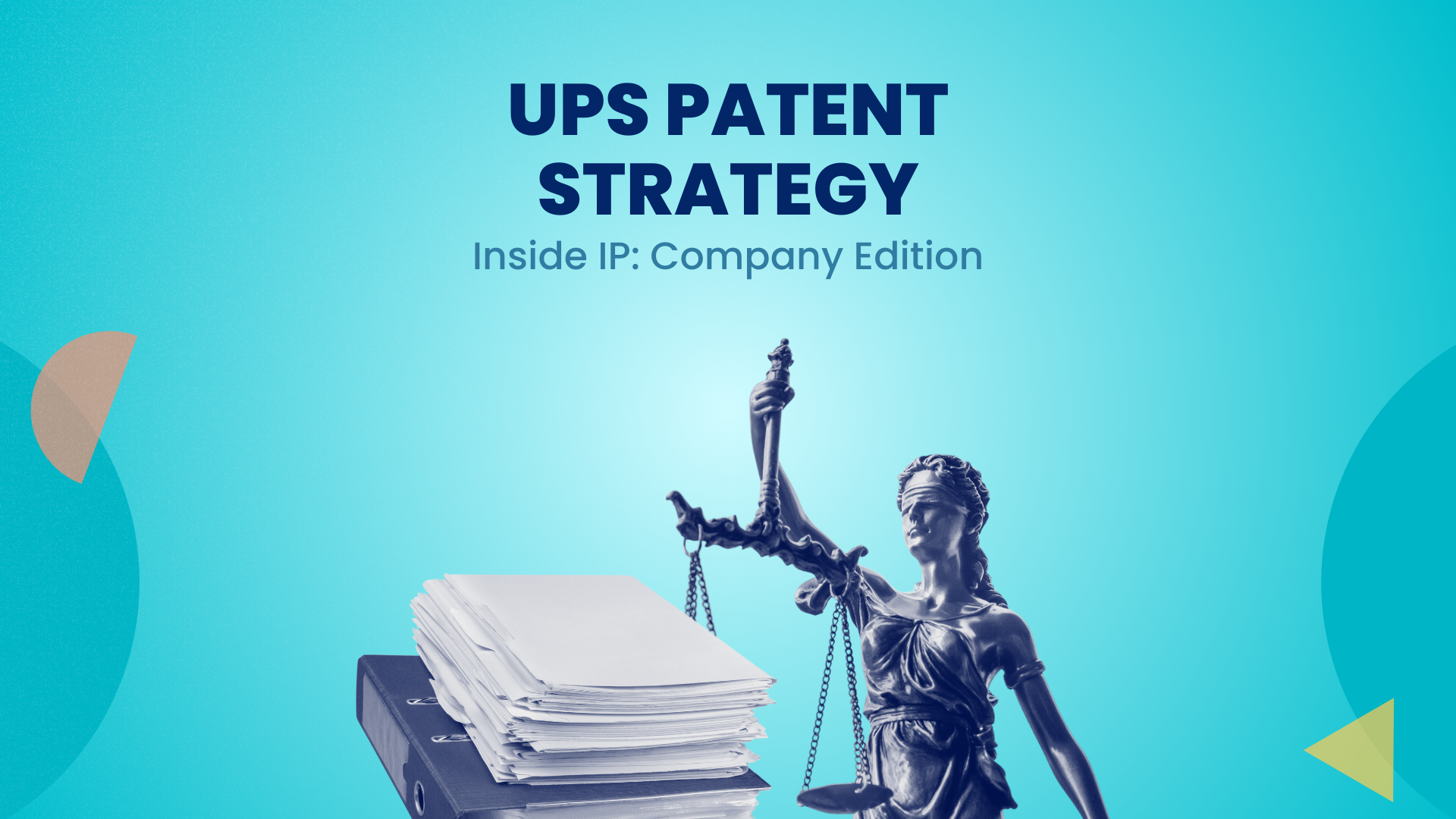In the dynamic world of logistics, where efficiency and speed dictate market leadership, intellectual property stands as a critical differentiator. United Parcel Service (UPS), a global titan in package delivery and supply chain management, exemplifies how a robust IP strategy underpins continuous innovation and market dominance. Far from being a mere delivery service, UPS is a technology-driven innovator, strategically focusing its patent efforts on pioneering advancements. The company’s portfolio prominently features the development of Unmanned Aerial Vehicle (UAV) systems designed for efficient parcel delivery, enhanced navigation for precise drone route planning, and sophisticated cargo handling solutions. Furthermore, UPS is actively innovating in aerostructures to optimize drone performance and communication systems for real-time fleet coordination. This commitment to technological enhancement reflects UPS’s proactive approach to shaping the future of package delivery and logistics.
Safeguarding Innovation: UPS’s Evolving Litigation Landscape
Analyzing UPS’s patent litigation activities reveals a nuanced and evolving strategy for intellectual property defense. Recent trends indicate a period of stability in its core transportation domain, with no major litigation cases reported in recent years, a notable shift from previous periods. This decline suggests a strategic realignment, potentially reflecting a reduced emphasis on litigating transportation-related patents or a focus on non-litigious strategies for innovation protection.
Interestingly, a nascent interest in semiconductor technologies has emerged, with a minor increase in litigation activity in this non-core domain. This development could signal exploratory ventures into semiconductor applications, possibly tied to advancements in logistics systems or IoT-enabled supply chain innovations. While UPS has maintained a stable litigation profile in drone technology, remaining uninvolved in disputes in this rapidly evolving area over the past decade, the company has participated in cases concerning logistics and supply chain management software. These disputes often involve Non-Practicing Entities (NPEs) asserting patents related to data processing, route optimization, and delivery automation technologies, underscoring the broad scope of IP challenges in the logistics sector.
Strategic Patent Filings: Reinforcing UPS’s Innovation Leadership
In parallel with its litigation posture, UPS has consistently reinforced its innovation leadership through strategic patent filings. The company’s commitment to strengthening its intellectual property portfolio is evident in its U.S. patent filing trends, which saw a moderate increase from over 400 patents filed during 2010-2015 to nearly 500 patents filed between 2015-2020. This steady growth reflects UPS’s dedication to developing cutting-edge solutions in logistics, supply chain management, automation, and delivery technologies.
Beyond domestic efforts, UPS has significantly expanded its global patent protection strategy. Its WIPO (World Intellectual Property Organization) application filings experienced a notable surge, increasing from a single application during 2011-2015 to more than ten applications in the 2016-2020 period. This shift underscores a broader international patent protection strategy, as UPS seeks to secure its innovations across key global markets.
Pioneering Logistics: Top Patents Driving Industry Evolution
UPS’s patent portfolio contains highly influential assets that are actively shaping the competitive landscape. A selection of its patents demonstrates significant licensing potential and strategic value, having been instrumental in rejecting numerous patent applications filed by competitors. One standout patent, US10198707B1, has been cited in rejections against over a dozen patent applications from industry giants like FedEx, DHL, and Amazon, highlighting its substantial impact and strength in logistics technology.
Below is a glimpse of some of UPS’s high-potential patents and their influence:
These patents, which were considered for this insight up to September 2024, are foundational to various aspects of logistics technology, from route optimization to delivery systems.
Shaping the Competitive Landscape: UPS’s Influence on Innovation
UPS’s IP strength extends to directly influencing the patenting efforts of other companies. Several prominent industry players have encountered rejections on their patent applications due to existing UPS patents. This not only underscores the foundational nature of UPS’s innovations but also highlights potential opportunities for licensing. Companies working on similar technologies have a clear incentive to explore collaborative or licensing agreements with UPS to advance their own development paths.
Patents of companies such as Workhorse Group Inc., Geotab Inc., Walmart Apollo, LLC, Ellansalabs Inc., Tesla, Inc. have been influenced by UPS with around 5-10 rejections per case.
Beyond rejections, UPS’s patents have directly led to the abandonment of competitor applications, showcasing the formidable strength of its intellectual property.
| Company Name | Abandoned Applications Due to UPS Patents |
|---|---|
| Walmart Apollo, LLC | around 4 |
| Ford Global Technologies, Inc. | around 2 |
| International Business Machines | around 2 |
| Geotab Inc | around 1 |
| Ellansalabs Inc | around 1 |
These instances demonstrate UPS’s significant impact on shaping the technological direction and patenting strategies within the logistics and automotive industries.
Global Reach, Local Impact: UPS’s Geographic Patent Strategy
UPS’s global patent portfolio reflects a carefully crafted strategy to protect its innovations across key operational and emerging markets. The United States remains its largest market, housing over 1,700 patents, reflecting its primary operational hub. However, UPS also maintains a strong presence across other significant jurisdictions.
Here’s a snapshot of UPS’s geographic patent distribution:
| Jurisdiction | Number of Patents |
|---|---|
| United States | over 1,770 |
| Canada | over 650 |
| European Patents | over 640 |
| WO – WIPO | over 600 |
| China | over 230 |
| Germany | over 230 |
| Austria | over 110 |
| Spain | over 100 |
| Mexico | around 90 |
| Australia | over 80 |
| Brazil | over 20 |
| Japan | around 20 |
| India | around 2 |
| Russia | around 2 |
Source: lens.org
The significant presence in Canada and Europe underscores UPS’s commitment to protecting innovations in major logistics markets. Furthermore, its strategic investments in emerging markets like China, Brazil, and Mexico highlight a forward-looking approach to global expansion. While UPS has concentrated its patenting efforts on these established and growing regions, it has maintained its strategic focus on specific areas for patent protection, choosing not to file patents in several Asian countries during the analyzed periods.
This global footprint is supported by a diverse base of innovators. Over the past decade, while most of UPS’s innovation has originated from inventors in the United States, the company also leverages talent from the Netherlands, Belgium, the United Kingdom, and France. This reliance on a global talent pool further fuels its technological progress and diverse patent portfolio.
Behind the Filings: UPS’s Strategic IP Tactics
UPS employs sophisticated IP tactics to optimize its patent portfolio and safeguard its innovations. One such strategy involves the use of Non-Publication Requests (NPR) for a handful of its U.S. patent applications over the past five years. NPRs allow companies to delay the public disclosure of patent applications, maintaining confidentiality around their innovations until they are ready for foreign filings or commercial agreements. This tactical approach enables UPS to protect its market share and strategically time the public unveiling of its cutting-edge solutions.
The technologies behind these strategically protected patents are central to UPS’s core operations:
- Optimizing Package Delivery: Methods for generating logistics zones and enhancing package delivery and pickup routes using geofencing and resource balancing.
- Customs Clearance Automation: Machine learning-based systems to automate classification in customs clearance, expediting imports.
- Synchronized Delivery for Efficiency: Techniques for bundling shipments and synchronizing deliveries to reduce fuel consumption and delivery times.
- Proactive Vehicle Maintenance: Systems for monitoring vehicle components to predict and prevent failures.
- Efficient Map Database Updates: Methods for effectively updating cached map tiles in map databases to reduce processing overhead.
These areas underscore UPS’s unwavering focus on improving logistics efficiency, enhancing predictive vehicle maintenance, and streamlining customs processes.
Supporting these strategic efforts are several top-tier law firms. Over the past decade (2014-2024), firms such as Shook, Hardy & Bacon L.L.P. (handling over 250 patents), Alston & Bird LLP (over 150 patents), and Zacco Sweden AB (over 100 patents) have played pivotal roles in managing UPS’s intellectual property. For its top jurisdictions, UPS collaborates with specialized firms: Zacco Sweden AB for European patents (over 80 patents), Shook, Hardy & Bacon L.L.P. for U.S. patents (over 200 patents), and Joseph W. Cruz for WO filings (more than a dozen patents). These partnerships reflect a sophisticated approach to IP counsel, tailored to specific jurisdictional requirements.
The ingenuity behind UPS’s innovations is also driven by a dedicated team of inventors. From 2003 to 2023, with approximately 250 INPADOC families, key inventors such as Robert J. Gillen, Mark J. Davidson, Julio Gil, Nagesh Kadaba, and Bala Ganesh have significantly contributed to the company’s robust patent portfolio, fostering a culture of continuous technological advancement.
Looking Ahead: UPS’s Continued Drive for Logistics Excellence
United Parcel Service’s comprehensive IP strategy, characterized by its pioneering patent portfolio, strategic filing tactics, and adept navigation of the competitive and litigation landscapes, positions the company as a true innovator in global logistics. By focusing on critical areas such as UAV systems, advanced automation, and efficient delivery solutions, UPS is not merely reacting to industry trends but actively shaping them. Its influential patents not only protect its innovations but also impact the trajectory of competitors, underscoring its foundational role in the industry. As the logistics sector continues its rapid evolution, UPS’s proactive and sophisticated approach to intellectual property management will undoubtedly remain a cornerstone of its sustained leadership and growth.
Want regular updates on how your competitors are using patents to gain an edge?
Subscribe to our Inside IP newsletter for insights into patent filings, litigation shifts, licensing opportunities, and strategy breakdowns across tech and innovation-driven sectors.
Track your Competitor’s Strategy
Subscribe for Updates

